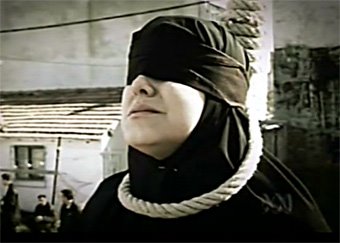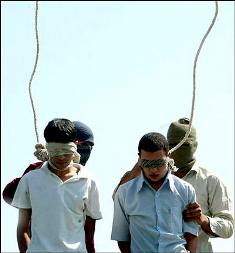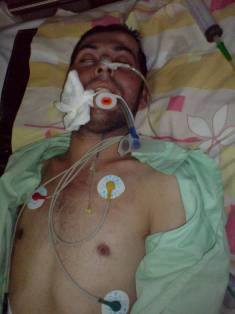News of the imminent stoning of one Iranian woman for alleged adultery galvanized a global movement to save her. But sadly, her case was not an anomaly.
Sakineh Mohammadi Ashtiani has been imprisoned in Tabriz Prison in northwestern Iran since 2005, having suffered 99 lashes and been condemned to die by public stoning for her alleged adultery. Until last month, those facts were known only to a small handful of people working quietly through the Iranian legal system to secure her release. Now, with Ashtiani’s story filling the pages of newspapers and Web sites around the world, her name, and the appalling details of her case, are familiar.
Judges relied on “wisdom” rather than evidence to determine her guilt, using a loophole in the Iranian legal system. But even by Iranian legal standards, the case was fraught. Ashtiani had no lawyer until late in the appeal proceedings, despite being illiterate and unable to speak Farsi, the language used in court, according to the International Committee Against Execution (ICAE). She retracted a confession she says was made under duress. Nonetheless, court after court signed off on her death warrant, until all legal avenues had been exhausted.
Her lawyer, Mohammad Mostafai, a frequent defender of death-row inmates in Iran, and her children, Sajjad, 22, and Fasride, 17, finally decided to go public with her story via the lawyer’s blog, at great personal risk. While the media-savvy Mostafai is enough of a public figure to make his arrest unlikely, says the ICAE’s Ahmad Fatemi, Ashtiani’s children have no such protection. Sajjad was recently summoned to the intelligence office of the Tabriz prison—a move, says Fatemi, that is meant to send a clear message. “That’s the part of the prison where torture takes place,” he told NEWSWEEK. “When they do this, it is to put pressure on a person.” Sajjad, he has been told by sources inside Iran, was wise enough to ignore the summons.
Iran's judiciary chief, Ayatollah Sadeq Larijani, has the power to halt executions and make recommendations to the country’s Supreme Leader, who decides whether to pardon prisoners convicted of crimes against God or state. For crimes against individuals, like murder, the victim’s family has final say.
For the last week, Iranian officials have said the case is under review on “humanitarian grounds,” but their reasoning is as unclear as Ashtiani’s fate. They have steadfastly denied that international attention had any effect on the decision, but they’ve also taken care to impose a media blackout on the case in Iran. Still, even postblackout, the ICAE has seen two local Iranian newspapers publish quotes from Tabriz’s head of the judiciary declaring Ashtiani’s execution to be imminent.
This directly contradicts what Iran’s human-rights chief, Mohammad-Javad Larijani, has said about putting the case under review. Then again, supporting his statements, the ICAE has obtained a document showing that the Supreme Court accepted a request to reopen the case. NEWSWEEK’s calls to the Iranian mission in New York for clarification went unreturned.
Still, while there is no guarantee that Ashtiani will walk free, given the global attention she’s received, she likely stands a better chance than the some 140 other prisoners sitting anonymously on death row in Tabriz alone, according to the ICAE’s count. An accurate count of the total number of prisoners on death row in Iran is impossible to come by.
The Iranian government doesn’t publish execution data, and many executions in Iran are never announced, with lawyers and family members often finding out only after they have taken place. According to the Abdorrahman Boroumand Foundation, which monitors media for Iranian death-penalty cases, 135 executions have taken place so far this year in Iran. Those are just the cases that can currently be confirmed, though, and the numbers are always rising. The foundation currently lists the total number of executions in Iran in 2009 at 399, second only to China (in the U.S., by contrast, there were 52).
Watching the numbers climb, rights experts say Iranians are wary of a return to the dark days of 1988, when the state executed more than 3,000 Iranians, largely for political crimes. While most executions in Iran are carried out for murder and drug crimes, the sentence can also be applied for sexual and political crimes like adultery, sodomy, corruption, and the broadly defined “enmity against God.” Just as problematic are the trials themselves, which often fail to meet standards for fairness set by treaties like the International Covenant on Civil and Political Rights, to which Iran is a signatory. Prisoners have reportedly faced torture, been held incommunicado, been denied counsel, and confessed under duress in cases leading to capital punishment; Iran also executes more juveniles than any other country in the world. NEWSWEEK consulted with human-rights groups to highlight eight other problematic cases involving inmates on death row in Iran:
Name: Azar Bagheri
Location: Eastern Azerbaijan
Bagheri, now 19, was convicted of adultery and sentenced to death by stoning at age 15. She claims she was forced to marry an older man the previous year, when she was 14. Her husband brought the case against her, claiming she had a relationship with another man. According to the ICAE, Bagheri has been subjected to two mock stonings, for which she was taken out of her cell and buried up to her shoulders in the yard, as if she were to be pelted with stones. Bagheri’s case came to light in the wake of the media storm around Ashtiani, likely because of ICAE founder Mina Ahadi’s contacts in Tabriz, where she had been held and her husband executed before she fled Iran in 1990. Ann Harrison, an Iran researcher at Amnesty International, believes Bagheri’s sentence might have been commuted to 99 lashes.
Name: Mohammad Ali Navid Khamami
Location: Gilan
Khamami, convicted of adultery, was also sentenced to be stoned. The last public reference to his case came last year, when judiciary spokesman Ali Reza Jashidi confirmed in a press conference that another man had been stoned to death in Gilan province and declined to deny that another stoning could be forthcoming.
Name: Kobra Babaei
Location: Eastern Azerbaijan
Married couple Rahim Mohammadi and Kobra Babaei were convicted of adultery while married. In an interview with the news Web site Rooz last year, their lawyer, Mohammad Mostafaei, said that the couple was unable to find work and turned to Babaei’s prostitution to support themselves. They have a teenage daughter. Rahim Mohammadi was hanged in October 2009, after being convicted of adultery and sodomy. Amnesty’s Harrison received information Thursday suggesting that Babaei’s sentence might be commuted to lashes, but this has not yet been confirmed.
Name: Maryam Baagherzaade
Location: East Azerbaijan
Baagherzaade, 25, was sentenced to death by stoning. She has been in jail for four years, but recently became pregnant during a short leave from prison. According to the ICAE, pregnant women on death row are usually allowed to give birth before they are executed.
Name: Fariba Shafaa’at
Location: East Azerbaijan
Shafaa’at was 14 when she was arrested and charged with the murder of her father. Now 20, she is on death row. In Iran, the legal age of adulthood for girls is 8 years and 8 months, allowing judges to sentence girls older than this to death. The ICAE received information from sources in Tabriz on July 12, indicating that judiciary authorities in Tehran have given the go-ahead for her execution. The method of her impending execution is unknown.
Name: Mohammad Reza Haddadi
Location: Fars
In 2004, Haddadi was convicted for a murder he allegedly committed when he was 15 years old. A court in Shiraz found Haddadi and his codefendants guilty of kidnapping and hiding the body of Mohammad Bagher Rahmat in an attempt to steal Rahmat’s car, but convicted only Haddadi of Rahmat’s murder. Rahmat’s body was burned and buried at the side of a road. According to Human Rights Watch, Haddadi has confessed to suffocating Rahmat with a belt after his codefendants struck Rahmat over the head with a stone and locked him in the trunk of the car. Haddadi, now 23, has had his execution scheduled and cancelled multiple times. Amnesty’s Harrison says this is because Iranian authorities are attempting to arrange a deal between the Haddadi family and the victim’s family for blood-money compensation but have so far been unsuccessful.
Name: Zeynab Jalalian
Location: Tehran
Jalalian, 27, was convicted of the crime of moharebeh, or “enmity against God,” for allegedly participating in the banned Free Life Party of Kurdistan, or PJAK. Her sentence, death by hanging, was approved by Iran’s Supreme Court in November 2009, even though she has been denied access to a lawyer throughout her detention. The trial was said to have lasted just minutes. Some media reports have her being held in Section 209 of Evin prison, which is run by the intelligence ministry, but they have not been verified. Four other Kurdish dissidents were executed without warning in May, and 16 more are currently facing execution, according to Human Rights Watch. Jalalian claims to have been tortured in detention.
Name: Jandarshah Nabizada
Location: Yazd
Sixteen-year-old Nabizada, a villager from northern Afghanistan, was sentenced to death at the Iranian-Afghan border after being caught carrying 200-300 grams of narcotics, according to an interview conducted by Radio Free Europe by phone in March. He is one of thousands of Afghans who have found themselves on death row in Iran, mostly as a result of drug smuggling. In Iran, a major drug transit route between Afghanistan and Western Europe, possession of more than 30 grams of hard drugs like heroin can result in the death penalty. An Afghan parliamentary delegation this past winter turned up 5,630 Afghan prisoners in Iran, about 3,000 of whom are on death row. The Iranian government disputes those figures but has not offered any of their own.

































































